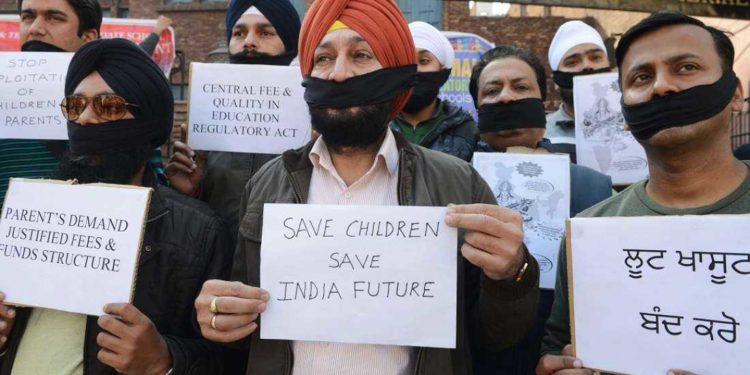The Supreme Court order will have far-reaching effects on Christian-run higher educational institutions
Members of a parents welfare association hold placards during a protest against a hike in fees charged by private schools in Amritsar on Feb. 3, 2018. (Photo: AFP)
In a verdict that will have far-reaching implications for minority Christian-run higher educational institutions in India, the country’s top court has ordered that while a minority educational institution is free to devise its own fee structure, the state has the power to regulate the same.
The Supreme Court made the ruling while hearing a petition which challenged the authority of a committee set up by the central Indian Madhya Pradesh state to regulate fees and admissions in minority-run higher education institutions in the state.
In its March 17 order, the Supreme Court said the minority institutions of higher education “should not claim complete immunity” in admissions and fee structures and “seek exemption from any interference” of the government.
The state established the committee in 2007 to fix the fees and supervise the admission process in the state’s private higher education institutions following complaints that these institutions were charging exorbitant fees.
The Church “accepts the verdict with mixed feelings,” said Father Maria Stephen, the Church spokesman in Madhya Pradesh.
He said Church institutions “do fix admission fees and other fees with the intention of making a profit. Our aim is to provide excellent structures and modern facilities. The fee regulatory committee should not compare private institutions with government-run colleges,” he said.
“My point is that both sides [government and private owners] should walk hand in hand with understanding and transparency to improve the quality of education. Efforts should be made to remove the misunderstanding that private institutions are profit-oriented businesses,” he said.
With its order, the Supreme Court was upholding a state high court verdict delivered on a petition filed by the Icon Education Society, a minority institution in Madhya Pradesh. The society refused to accept the authority of the state committee to scrutinize its fee structure.
The society complained to the court that the state committee violated the right of religious and linguistic minorities to establish and manage educational institutions for the betterment of their communities, without the interference of the government. It is a right guaranteed in the Indian constitution, they argued.
But the Supreme Court observed that the government has supervisory powers over institutions functioning in a state. It asked the society to submit the fees proposed by it for the state committee’s “review and regulation.”
“Setting up a reasonable fee structure is also a component of the right to establish and administer an institution….and every institution is free to devise its own fee structure subject to the limitation that there can be no profiteering,” the court said.
In order to achieve that purpose, the state has to “regulate admission and fee structure,” the top court said.
The court also said there could be no capitation fee imposed on parents directly or indirectly or in any form.
Govind Yadav, a lawyer in the Supreme Court, said the judgment is “applicable to all minority-run higher education institutions.”
The court has not “interfered with the rights of minorities to establish and administer their institutions, but curtailed their unbridled power to charge whatever fees they wish,” he told UCA News on March 21.
Such regulatory systems exist in some states. But with the judgment “sooner or later, all minority institutions will have to subject their decisions” to such regulatory bodies, Yadav said.
The judgment will help students get higher education at a reasonable rate at private institutions, including those run by religious minorities, he said.
Christians who make up 0.29 percent of the more than 72 million people in the province, run hardly a few higher education institutions. However, their presence in school education is huge compared with other religious communities.
Latest News
Credit: Source link




